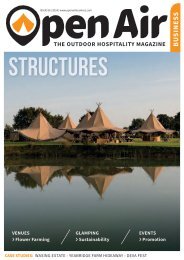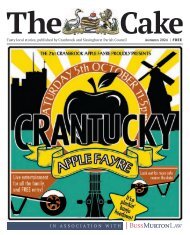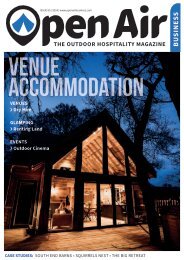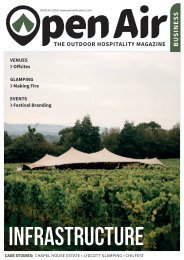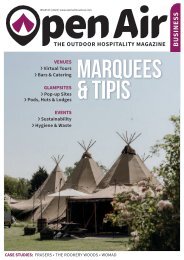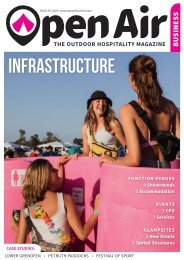Open Air Business April 2017
The UK's outdoor hospitality business magazine for function venues, glampsites, festivals and outdoor events
The UK's outdoor hospitality business magazine for function venues, glampsites, festivals and outdoor events
Create successful ePaper yourself
Turn your PDF publications into a flip-book with our unique Google optimized e-Paper software.
EVENTS<br />
› what are the existing amenities - consider<br />
water supply, power, outbuildings etc.<br />
We have a wide range of fields listed on<br />
Field Lover and large numbers of ‘field<br />
seekers’ searching for land for a variety of<br />
uses. As we head into summer and longer<br />
evenings, land for outdoor events is in<br />
high demand. When deciding whether to<br />
hire your land for a public event it is worth<br />
considering your type of event using the<br />
‘low to high risk approach’.<br />
A low risk event defines small scale<br />
events that require a lower capital<br />
investment, shorter planning period (+3<br />
months) and generally have less than 1,000<br />
attendees, such as:<br />
› car boot sales<br />
› charity fundraisers such as fêtes and dog<br />
shows<br />
› local food festivals or farmers markets<br />
› theatrical performances<br />
Medium risk applies to events which<br />
require a larger investment and a longer<br />
planning period (+6 months), these could<br />
include:<br />
› country shows<br />
› car rallies<br />
› sporting events, such as obstacle course<br />
races and local horse shows<br />
› local music festivals<br />
SHUTTERSTOCK<br />
High risk events will have large attendee<br />
numbers and complex infrastructure<br />
such as staging, large scale amenities<br />
and parking, or they may have a high-risk<br />
element to them such as a firework display.<br />
Initial investment is high and the planning<br />
period would be +12 months. They might<br />
include large music festivals.<br />
KEY CONSIDERATIONS<br />
Before planning any event, you need to ask<br />
some important questions:<br />
1) Who are my anticipated audience?<br />
Family-focused events tend to be lower<br />
risk than events aimed at young adults.<br />
Consider requirements for visitors such as<br />
the elderly or disabled - is the site suitable?<br />
2) Where will visitors be travelling from?<br />
Will your event attract visitors from further<br />
afield? Consider what the impact of<br />
increased footfall and traffic to the local<br />
area during the event period might be.<br />
3) Is my site big enough?<br />
A small-scale event is usually considered<br />
less than 1,000 attendees. For anything<br />
larger it is well worth seeking help from<br />
an event planner who has the knowledge,<br />
skills, contacts and experience in planning<br />
and organising larger scale events.<br />
4) What is the timing of my event?<br />
Events held during the daytime are lower<br />
risk than those which run into the evening.<br />
You’ll need to ensure adequate lighting<br />
can be provided to assist visitors with<br />
navigating the site after dark.<br />
Next on your list is your Event Plan. Your<br />
event should be well planned from the<br />
outset, here you identify who is responsible<br />
for each area, the tasks leading up to the<br />
day, your list of actions and timeline to<br />
ensure everything is covered before, during<br />
and after the event, such as the clear up.<br />
As a general rule, a low risk event will<br />
require less planning, resources, licensing<br />
and insurances than a higher risk event;<br />
plan your timeline accordingly.<br />
LICENCES AND NOTICES<br />
Identify early on which licences you need<br />
to apply for and what notices need to be<br />
issued. Once this has been done, draft a<br />
timeline to ensure you have all applications<br />
SHUTTERSTOCK<br />
agreed and licences in place well before the<br />
event day.<br />
Your first point of call is your local<br />
authority, this is the local authority where<br />
your event will take place. Give details<br />
of your event and they can advise on the<br />
appropriate time scales for planning, who to<br />
contact and any licence or other applications<br />
that are required. Expect to give at least six<br />
months’ advance notice for a large event<br />
with more than 1,000 people attending, or<br />
where public safety is a concern.<br />
Don’t be put off by the thought of too<br />
much red tape. It’s pretty straightforward<br />
and can be helped by following simple<br />
checklists, and breaking areas down into<br />
a step by step approach can ensure the<br />
process is painless. Planning an event can<br />
be a lot of fun, very rewarding and profitable<br />
for both the landowner and event organiser.<br />
Careful planning and organisation ensures<br />
your event is successful and safe.<br />
For smaller, lower risk events allow a<br />
minimum of three months for consultation<br />
with all services that may be affected -<br />
such as police, local authorities, fire and<br />
rescue, ambulance service, emergency<br />
planning department, event safety team and<br />
Highways, as well as to notify all properties,<br />
residences and businesses that may be<br />
affected by your event.<br />
Below are some other licences you may<br />
need. As part of your enquiries and licence<br />
submissions you may need to provide maps,<br />
site or route plans.<br />
Advance Notice – One month before your<br />
event you or your organiser must post a<br />
public advance notice stating the event<br />
details and effect of the event – make sure<br />
to describe any alternative route(s) available<br />
to traffic.<br />
› Temporary Event Notice (TEN) - Under the<br />
Licensing Act 2003, some events may require<br />
a licence or a Temporary Event Notice (TEN).<br />
Apply to your local authority where your<br />
event is being held, or online.<br />
› Entertainment Licence – It’s worth noting<br />
that it can take up to three months from<br />
application for an Entertainment Licence.<br />
› Film - If you plan to show a film publicly<br />
you will need a Single Title Screening<br />
Licence (STSL), obtainable online from BFI,<br />
Filmbank and MPLC.<br />
› Food and Drink - Will you be providing<br />
food or alcoholic drinks, and if so is a license<br />
or hygiene certificate required? It can take<br />
up to six months for an application for a<br />
Temporary Alcohol Licence, so ensure you<br />
submit as early as possible.<br />
› Fireworks, Chinese Lanterns or a<br />
Bonfire - It can take up to one month for an<br />
application for a firework display outside of<br />
the bonfire night and New Year periods. This<br />
must be submitted to the fire and rescue<br />
service.<br />
WWW.OPENAIRBUSINESS.COM 53




